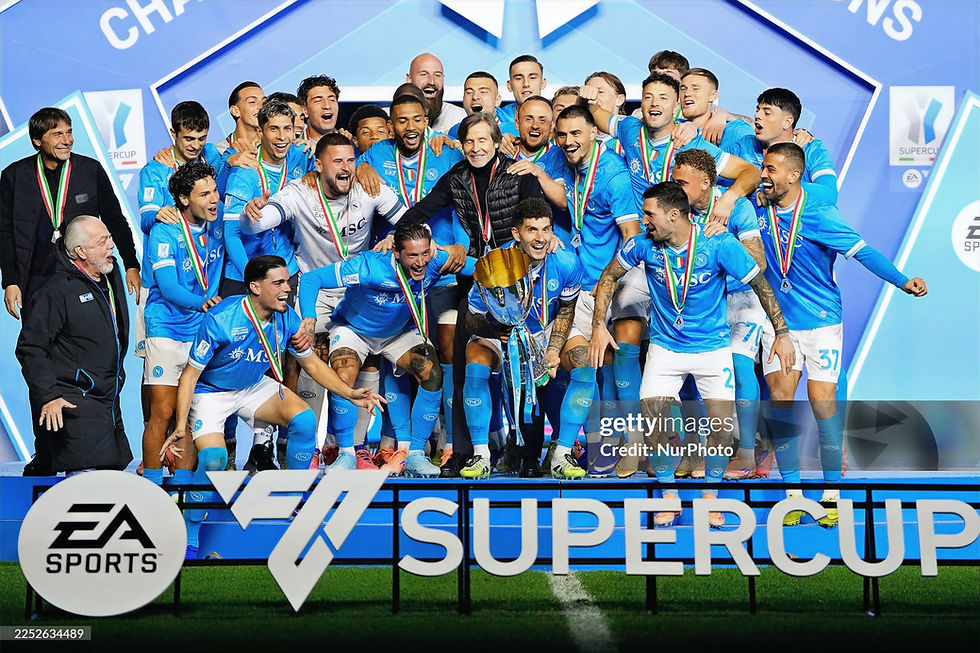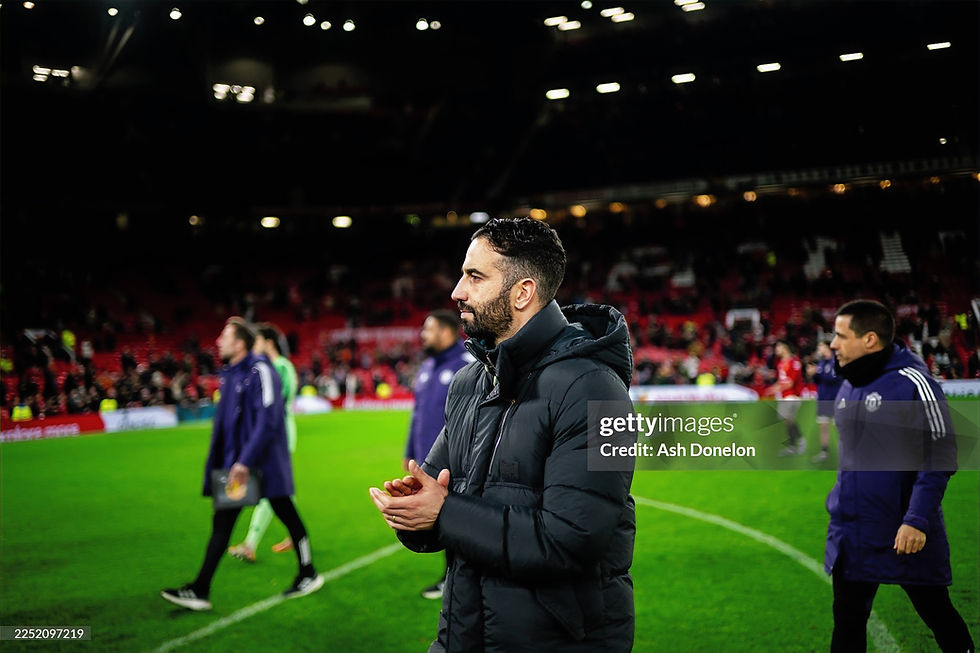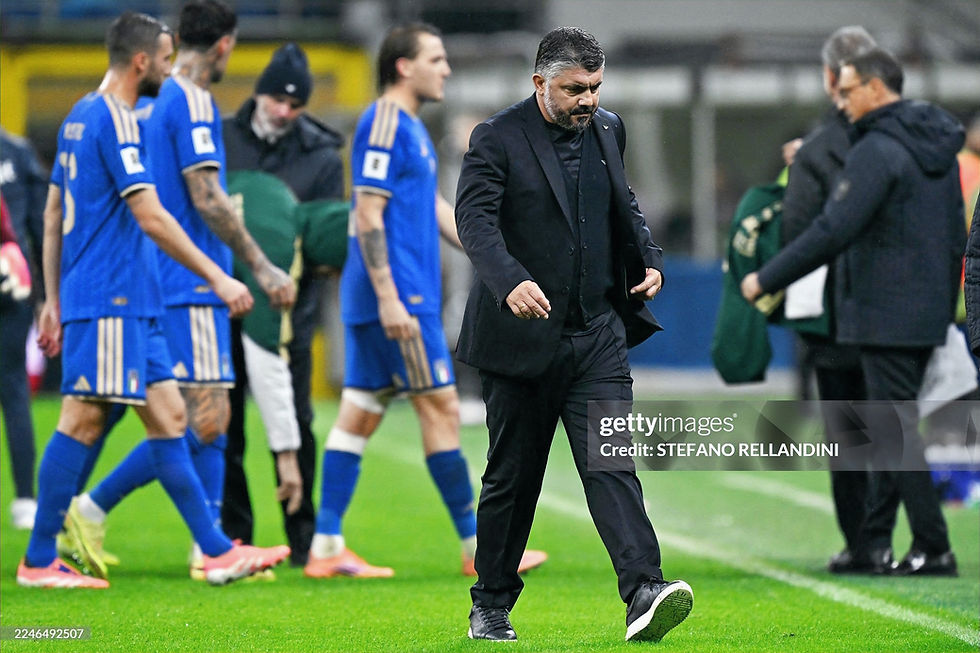PSG reborn: How have they got here?
- Christian Paris
- May 10, 2025
- 8 min read

Days on from the culmination of a thrilling tie with Arsenal at the Parc de Princes, a second trip to the UEFA Champions League final in their club’s history now booked in Munich on May 31 against Inter Milan, the opportunity to conclude the 24/25 season in style remains very well on the cards for Paris Saint Germain.
Luis Enrique, enlisted with the responsibility to spearhead the Parisians to a first European title after over a decade of failure against Europe’s elite, arrived in the French capital in the summer of 2023 with a certain vision.
There was to be no expected issues in Ligue 1. The Spaniard joined the reigning champions, and back-to-back winners part of a dynasty that saw PSG eviscerate the competition in France, claiming 9 out of the previous eleven titles.
No. That was not the overriding goal. It had always been the first honour to win in each season, but not the ultimate pinnacle. Though with the glitz and glamour in Paris, the consistent arrivals of some of world football’s top stars, it has been a continued struggle.
The first go round saw Zlatan Ibrahimovic, Edinson Cavani, Thiago Silva and co fall well short, failing to make it past the Quarter-Final stage from the 12/13 campaign to 15/16.
Let’s not rewrite history though. This was not a side glittered with stars at the top end of the pitch and struggling defensively. It included Silva as previously mentioned, David Luiz arrived later down the line to join his fellow Brazilian, Marco Verratti and Blaise Matuidi both more than held their own in central midfield, but, it was not working.
Club Chairman, Nasser Al-Khelaifi, set out towards his vision when he bought PSG in 2011, though the first five years under his tenure had seen the French giant's stumble frantically in Europe.

The initial strategy, meanwhile, to increase exposure, to put PSG on the global map was working in that sense. Al-Khelaifi had worked to make the Parisian’s the attractive outfit in world football for not just aging stars, but the best in Europe.
David Beckham joined at 38, Ibrahimovic still world-class, joined at 31, Thiago Motta at 29, along with high-profile names entering their peaks – Cavani and Silva were 27 and 28 respectively. There was certainly method to it, far from any long-term foresight though.
The second attempt took it to a whole new level in Paris, sparked by smashing the world record transfer fee for FC Barcelona superstar Neymar Jr in the August of 2017. Al-Khelaifi was not going to rest.
Kylian Mbappe quickly joined the Brazilian forward initially on loan in the same season, before PSG did not hesitate to scoop out another €180m for the phenom the following campaign. For some a signal of intent, for others, signs of patience thinning beginning to show.
It is also important to note that throughout PSG’s rise, they had never sustained continuity with the same manager for more than three consecutive seasons, surely not the recipe for sustained success on the world stage.
The two stars faltered to even get past the Round of 16 in the Champions League in 17/18 and 18/19 respectively, first under Unai Emery, then Thomas Tuchel. The latter was able to then pick up the pieces in 2020 and lead his fearsome forwards to the final of Europe’s elite competition against Bayern Munich, before falling to a gutting 1-0 defeat.

Amidst all this chaos, an overriding theme continued to break through the cracks in Paris. Despite the names, all the star power and individual quality, there was never a togetherness, a resilience, or a unity where you felt Paris Saint Germain were ready to take the next step. Not with some of the sides that were lurking in Europe.
A blend of Carlo Ancelotti and Zinedine Zidane’s dominant Real Madrid side, Juventus and Atletico Madrid had their successful spells, along with Pep Guardiola’s Manchester City and Jurgen Klopp’s Liverpool. Simone Inzaghi’s Inter had even joined the fray.
Even with the arrival of Lionel Messi that sent shockwaves around the world in 2021, it only went backwards in Paris first under Mauricio Pochettino, then a season with Christophe Galtier.
Domestic success again, remained relatively straightforward, successive league titles with on paper, the most potent forward line in Europe, though consecutive Round of 16 exits in the Champions League was the final straw. It was time to go in a different direction.
At the end of that cycle, it was clear that for Paris Saint Germain to be taken seriously amongst Europe’s top sides, there had to be an improved way of doing things.
Neymar and Messi both departed the French capital in the summer of 2023, whilst in came the seasoned Enrique in the dugout. A new voice, with new intensity, but it had to be a long-term investment.

Perhaps, the appointment of Luis Campos the previous summer as a Strategic Advisor was of equal significance. Campos had a year to assess and be decisive in the market to build a squad Enrique could compete with.
There was no wasting time. Campos led from the front with this strategic transformation. In came Vitinha, Nuno Mendes, and Fabian Ruiz for a combined £86m in the summer of 2022, all of which have proven influential in this run to the Champions League final.
They had joined a terrific young core that included Achraf Hakimi and Gianluigi Donnarumma, along with of course Mbappe entering his prime, though noise was constantly building of a certain Spanish giant circling, particularly with the Frenchman’s contract running down.
It was not until Enrique was appointed though that progress accelerated. In that summer window, the Spaniard alongside Campos opted to chase a blend of sublime talent and youth with Ousmane Dembele, Bradley Barcola, and Goncalo Ramos in the door.
That 2023 window must be considered as the most significant in this run, not just with the arrivals as mentioned above, but the ruthlessness to part ways with the likes of Neymar, Messi, Sergio Ramos, Julian Draxler and Mauro Icardi – the new Paris Saint Germain was taking shape.

Enrique was eager to see his vision realised in Paris. The 23/24 season saw success domestically, winning both Ligue 1 and the Coupe de France, and after successive disappointments in the Champions League, the Parisian’s reached the final four of the competition for the first time since 2021, though, yet again, it was not enough.
The president, Al-Khelaifi, must take huge credit for this change. Over a decade of struggle particularly in Europe meant the Qatari had to take on a divergent strategy, but in this period, it was not just change on the pitch that was needed, but a cultural one.
For large periods of his tenure, Al-Khelaifi's method to success was one full of glamour, star power and a focus on building a global brand, though amid this, fans were struggling to recognise their own club.
One that was built on the city, the people. The club had to find a way back to its roots, and with Enrique it was slowly reemerging. Al-Khelaifi had found his man at last, but after an encouraging first campaign with the Spaniard, there was still work to do.
Dembele, Mbappe, Barcola and Ramos could not create the synergy from the front. Mbappe collected his usual video game numbers with 44 goals, though the other three forwards struggled for production.
It was not until the decision that saw Mbappe leave the French capital at the end of that campaign to head to Madrid, that a new ethos was needed on the pitch.

He was the last of the stars to go, and with him went the laboured intensity, the lack of a collective identity, the individual selfishness – Enrique would not allow it.
Then came in the final pieces. The bullish Joao Neves from Benfica, sparkling talent Désiré Doué from Stade Rennais, and William Pacho from Eintracht Frankfurt to join club captain Marquinhos at the heart of defence. Doué’s arrival was symbolically critical for the club, and the new vision, he like Barcola, and Dembele, knew the city, the culture, and brought it every single day on the pitch.
Khvicha Kvaratskhelia was another key addition for Enrique in January 2025, a world class Georgian talent, a Scudetto winner with Napoli, but another who was a symbol of that street football style, one that remains so prominent in Paris.
PSG were on course for the first invincible campaign in French league history before defeat to OGC Nice just over two weeks ago, whilst a breezy run to the Coupe de France final against Stade Reims sets up a grandstand finish to a season that could end with a treble.
Enrique’s men initially stuttered in Europe, with a new league phase format supposedly brought in to give the so-called lesser sides a greater chance of qualification, PSG scraped their way through into the playoffs finishing 15th with no real conviction, but the knockout stages saw PSG erupt with a new lease of life.
After swatting Brest aside in the playoff round, a daunting meeting with now Premier League champions Liverpool awaited in the Round of 16. A sensational display at the Parc de Princes in the first leg somehow concluded with a 1-0 defeat following Harvey Elliot’s late winner.
That first game however, put Europe on notice, and the French giant's confidence heading to Anfield, where Dembele’s early goal to level the tie led to a dramatic shootout victory, made even more of a statement.

It in fact began a streak of meetings with some of England’s finest teams in Europe, a Quarter-Final with Aston Villa beckoned, with a completely different challenge to face, but a 3-1 victory in the home leg was narrowly enough to see PSG through, despite a late resurgence from Emery’s side in the second leg.
It somehow, felt different this time. Though the French side had been in the final four before, there was a total belief, ushered through their confidence on the pitch.
Some of the football played was mesmerizing at times, though the semi-final with Arsenal taught the world a lesson about this PSG team. They were not just a beautiful side to watch.
The Gunners were fresh off the back of a mammoth two-leg victory over holders Real Madrid and had belief of their own. Dembele’s early strike at the Emirates dented that slightly, though under some pressure in spells throughout, the Parisian’s showed a resilience and togetherness that had been dangerously absent.

They battled to a 1-0 away win, though again, more pressure arose around the recent history in Paris ahead of the all-important return fixture. Labelled as serial losers, even ‘bottlers’ in Europe at times, this was the chance to stop all of that.
Noise quickly circulated of the likelihood of a potential recovery from Arsenal, and when they started well at the Parc de Princes, it felt like one of those nights, but PSG again remained resolute.
It was honestly refreshing to see. PSG had changed, and for the better. They soaked up the pressure at one end and were clinical at the other, Ruiz belted in the opener before Hakimi delightfully curled home a second. They could see the final in Munich.
A late Bukayo Saka effort was not enough for the English giant to come-back, and PSG had in fact made it. The roar of the Parisian crowd, with emotions running high, it became much clearer that night.
It was not just about winning a football match or making the final. Fans could recognise their own club again. Its identity. On the pitch and off it.

The connection between the supporters and players was vivid, real. The opportunity to lift the Champions League was next up, but for that moment, the club had realised something far greater.
The trophy will provide substance, something tangible, but it confirmed something for Al-Khelaifi and co, you cannot simply buy success in this sport, you must earn it. They have earned the acclaim, for now at least, but still with a huge step to take.





Comments